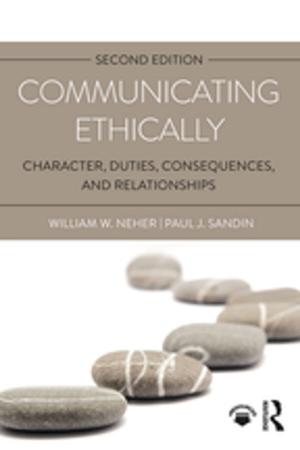Criminal Justice
An Introduction to Philosophies, Theories and Practice
Nonfiction, Social & Cultural Studies, Social Science, Crimes & Criminals, Criminology, Sociology| Author: | Ian Marsh, John Cochrane, Gaynor Melville | ISBN: | 9781134318674 |
| Publisher: | Taylor and Francis | Publication: | July 31, 2004 |
| Imprint: | Routledge | Language: | English |
| Author: | Ian Marsh, John Cochrane, Gaynor Melville |
| ISBN: | 9781134318674 |
| Publisher: | Taylor and Francis |
| Publication: | July 31, 2004 |
| Imprint: | Routledge |
| Language: | English |
This new text encourages students to develop a deeper understanding of the context and the current workings of the criminal justice system. The first part offers a clear and comprehensive review of the major philosophical aims and sociological theories of punishment, the history of justice and punishment and the developing perspective of victimology. In the second part, the focus is on the main areas of the contemporary criminal justice system, including the police, the courts and judiciary, prisons and community penalties.
There are regular reflective question breaks which enable students to consider and respond to questions relating to what they have just read and the book contains useful pedagogic features such as boxed examples, leading questions and annotated further reading.
This practical book is particularly geared to undergraduate students following programmes in criminal justice and criminology. It will also prove a useful resource for practitioners who are following vocationally based courses in the criminal justice area – in social work, youth justice and police training courses.
This new text encourages students to develop a deeper understanding of the context and the current workings of the criminal justice system. The first part offers a clear and comprehensive review of the major philosophical aims and sociological theories of punishment, the history of justice and punishment and the developing perspective of victimology. In the second part, the focus is on the main areas of the contemporary criminal justice system, including the police, the courts and judiciary, prisons and community penalties.
There are regular reflective question breaks which enable students to consider and respond to questions relating to what they have just read and the book contains useful pedagogic features such as boxed examples, leading questions and annotated further reading.
This practical book is particularly geared to undergraduate students following programmes in criminal justice and criminology. It will also prove a useful resource for practitioners who are following vocationally based courses in the criminal justice area – in social work, youth justice and police training courses.















